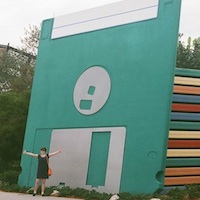Introducing: Audiovisual Preservation Training
22 Dec 2017Hello! I think a proper introduction is in order.
Audiovisual Preservation Training ✨
First, a backstory. I was homeschooled. Well, at least that’s what I tell people, because it’s easier to say things in three words than it is in three sentences. Actually, I spent high school doing correspondence courses via a combination of physical mail and the internet. I don’t know which was the cause and which was the result, but I’m pretty driven to seek out learning on my own. I also grew up in a rural environment, surrounded completely by grass for ~10 miles on all sides, so I didn’t have the resources that I’m so privileged to have now living in the biggest city in the States (and yet woefully take it for granted!).
All of this to say, education is foundationally important to me. And unrestricted access to education is important to me. I want what I wish I had access to when I was first coming into the field (many?) years ago.
So, something I am launching now and look forward to continuing work on in 2018 is this collection of audiovisual preservation training materials, available ✨ here. I’m very excited to put everything I know in one place and I hope it will be helpful to others, to a me-eight-years-ago.
What do I hope to achieve with this? I want to:
- Use it to teach others.
- Allow others to use it to teach themselves.
- Allow others to use it to teach others.
This field has a gatekeeper problem. Conferences are a wonderful way to meet colleagues and learn about the field, but they are prohibitively expensive, requiring registration fees, hotel fees, travel costs, and time taken off of work. And many conferences still do not put their material online for free betterment of the field broadly, so not only is the networking value lost to those who can’t afford to attend, the educational value is also lost.
Local audiovisual archiving training is up to ~$118,052 (not including rent and other costs for 2 years), which is a salary that few in our field will achieve, even at the top of their careers. This number is utterly staggering, especially compared to my Southern scholarships-and-state-school training (BA+MLIS ≈ 1 semester). And yet students and emerging professionals in our field complain about their education being insufficient (across the board, myself included). I believe in education, but not like this.
Addendum for a local comparison – Pratt rolls in at around $55k for an MLIS. They estimate around $105k when factoring all expenses attending full-time for 2 years.
So what is to be done? I sort of intrinsically demand that education should be free – in the many definitions of the word. Free as in gratis (one should not have to pay*), free as in libre (it should not be restricted), and free as in “freely shared amongst each other.” Don’t we all have the same goals?
* (For the residual produced content. I understand paying people for their labor – teaching is hard work. Also, we live in capitalism, which puts a real damper on everything.)
This isn’t entirely out of the goodness of my heart, of course, so I don’t want to trick you into thinking it is. These documents help me a lot, because I also teach and need consistent slidedecks from which to pull from and personalize depending on the class. (Should I mention here that you can pay me to teach or run workshops, or should I have mentioned that after I complained about living under capitalism? 😘). I also like how the decks are components that can be configured together or work independently, growing or shrinking the lessons. And because I share everything I do anyway (open source for life, in life), it seems to be a good way to keep all of the information structured, in the same place, and aesthetically similar.
Here are my goals moving forward with this project:
- Deepen content. Right now most of this relies on me-or-someone being present to go into more details than the slides currently do, but by adding speaker’s notes, it can become more in-depth.
- Expand content. I have a huge list of things I want to add, but it takes time making sure I know what I’m talking about!
- Be wrong and have those wrongs corrected. (This has already happened! yayyayay) Who peer-reviews lectures given in classes that are not open to peers?
- Have people contribute. I went back-and-forth on whether or not I wanted to push this as a shared resource outside of my own domain, to strive for community-driven and selfless work like my sweet ffmprovisr, but finally opted to keeping it personal, because teaching is also personal and opinionated. Also it means I can make dumb jokes. I do hope people will still feel free to modify, clarify, and better contextualize the material, just as they are free to use it in teaching others (Note: SHARE-ALIKE!).
- Different content? Some initial feedback from a couple of people was that they like videos for learning, which is manageable and sorta helps in deepening the content.
Thank you for reading this too-long rant. I can’t change the sad state of our field (jobs requiring master’s degrees, debt, cronyism, underpayment) but I hope I can better facilitate the supplemental knowledge that one needs to succeed in it.
